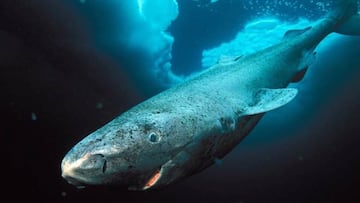Why do Greenland sharks live so long?
Scientists recently revealed why the longest-living vertebrate has such a long life span. Studying the Greenland shark can spur better anti-aging therapies.

Researchers have revealed new findings about the Greenland shark (‘Somniosus microcephalus’), highlighting its incredible longevity and exceptionally stable metabolism throughout the years.
This discovery, presented during the Annual Conference of the Society for Experimental Biology in Prague, suggests that the constant metabolic activity of their muscles could be the key to their longevity.
Why do Greenland sharks live so long?
The Greenland shark is known to live over 270 years, and some can reach 500 years. Ewan Camplisson, from the University of Manchester in the United Kingdom, explained that his team investigated how this animal achieves such a long life.
Contrary to previous beliefs that their long lifespan is due to the cold environment and low activity, the study revealed that the animal’s muscle metabolism does not show significant signs of decline with age.
READ ALSO: NASA provides additional information about the x- and c- shaped structures in the atmosphere
The Greenland shark is one the longest lived animals in the world. One was recently spotted in Popes Harbour, Nova Scotia. You can see the video here: https://t.co/obqM0TOeDP pic.twitter.com/S4EPeHqs83
— MA Sharks 🦈 (@MA_Sharks) July 26, 2024
Tests to measure metabolic activity
To measure the metabolism of these sharks, Camplisson and his team carried out enzymatic assays on samples of preserved muscle tissue from several sharks. The team found no substantial variations in metabolic activity between sharks of different ages.
“We want to understand what adaptations they have that allow them to live so long,” said Camplisson, highlighting that most species experience changes in their metabolism with age, unlike the Greenland shark.
Studying the shark further could help provide information on how to improve the heart health of humans.
“By studying the Greenland shark and its heart, we may be able to better understand our own cardiovascular health,” said Camplisson.
READ ALSO: A look inside a black hole
Greenland shark may not be cold-adapted
The research also revealed that the shark’s metabolic enzymes were more active at higher temperatures, challenging the idea that they are especially adapted to the polar cold.
Related stories
“This would suggest that the shark red muscle metabolism is not especially adapted to the polar environment. Otherwise, we would have expected to see a smaller temperature-related difference in activity,” Camplisson said.
However, a female Greenland shark may not reach sexual maturity until she is 150 years old, so the species would have much less chance to adapt to changes in its environment when the time comes to reproduce. Understanding their unique metabolism could help develop strategies to protect this vulnerable species in a rapidly changing world.


Complete your personal details to comment